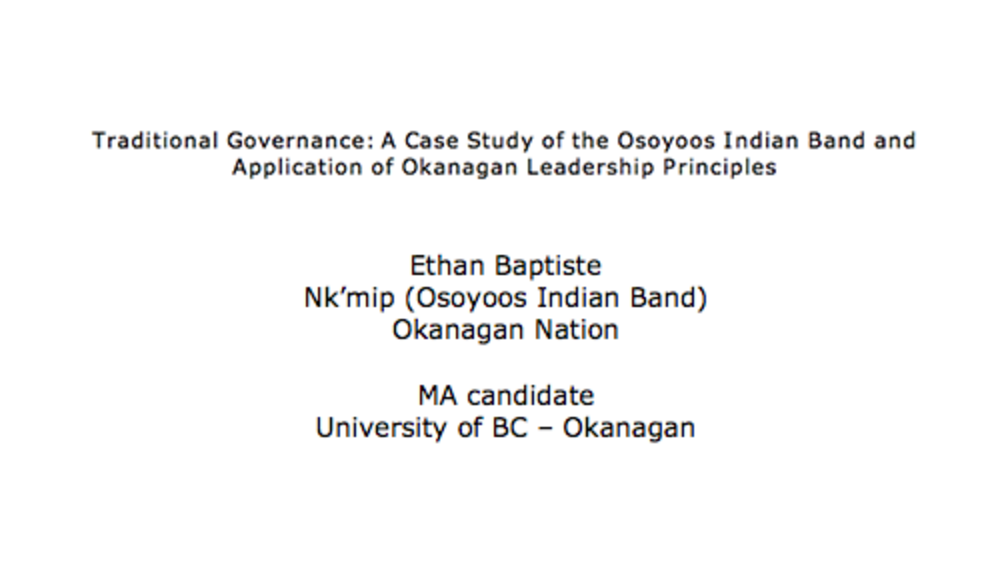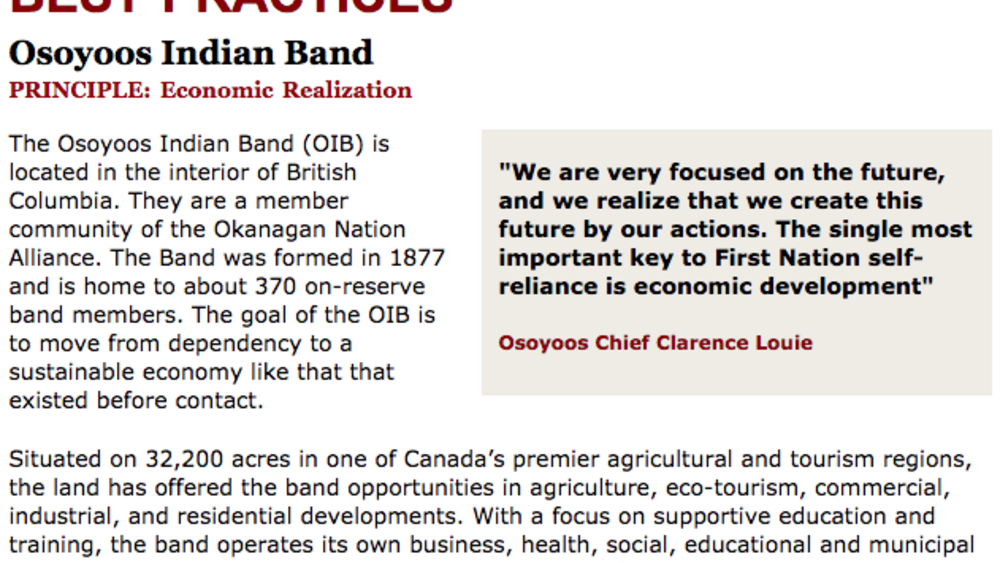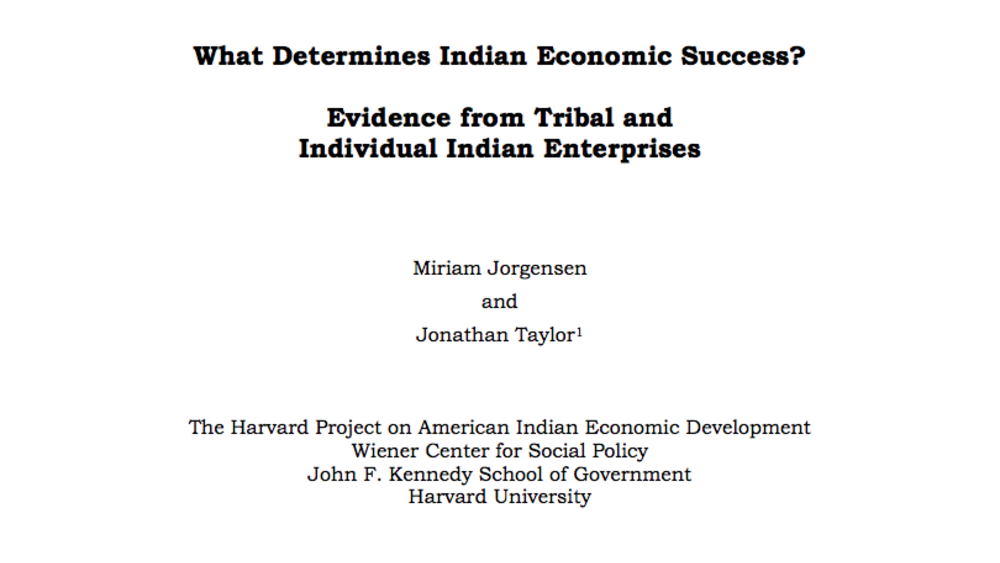Osoyoos Indian Band Development Corporation (OIBDC) Chief Operating Officer Brian Titus provides an overview of OIBDC and the reasons for its success, notably the great lengths it goes to educate Osoyoos citizens about the corporation's activities and overall health.
Additional Information
Titus, Brian. "Nation-Owned Enterprises: Osoyoos Indian Band Development Corporation." Building and Sustaining Tribal Enterprises seminar. Native Nations Institute for Leadership, Management, and Policy, Udall Center for Studies in Public Policy, University of Arizona. Tucson, Arizona. March 29, 2007. Presentation.
Transcript
"This is our motto: ‘Join the people on the move.' We used to have a vision statement called ‘Be self-supporting by 2005' but we've already passed that. We became self-supporting in 2003. What that means is that we generated more revenue from our businesses than we received from the government and we were quite proud of that. A little bit about the Osooyoos Indian Band: we're located in South Okanagan in British Columbia. Right along there's the border. Our reserve is 32,000 acres. We have 450 band members. We're also a major player in the South Okanagan economy. We produce a number of jobs, a lot of jobs. We also produce, 25 percent of wine grapes that are produced in British Columbia are produced on our reserve.
Late last summer, last June we opened up the Desert Center -- it doesn't show up very well on here -- but this is our resort. There's the winery, there's the golf course and down below here we have our campground. This is a little bit better picture. The whole South Okanagan have basically adopted the adobe style in their architecture over the last 15 years or so. This is a poster, a close up of what the Nk'Mip Cellar looks like today. We serve food there. It's aboriginally themed. You can go there, have a few muskocks, bison, moose, deer. Also just to mention again that we're one of the hosts aligned for the 2010 Olympics. We're very proud of that. We're associated with, it said Vincor International but now it is Constellation, which is out of Rochester, New York, who produce, who is the largest wine producer in the world today. This is what the desert center looks like in the back. This is rammed earth. It's one of the biggest pieces of rammed earth in North America. It's what the Great Wall of China is made of. And one of our statues. The golf course that's at the Spirit Ridge area right now, we have actually two golf courses on reserve. This one is a nine-hole executive. This is a picture of the campground. We have a facility there that holds up to 200 people. It has a swimming pool, workout area, things like that. Camping's not even camping anymore. Half of these people that come in they live in half million-dollar RVs. They ask for direct line telephones to their units, TV. You name it, they ask for it and they get it; they get wi-fi. This is a picture of the vineyards. This is the oldest company of all our companies. It was first established in 1968. We produce a number of winning wines throughout the whole region, in the Okanagan. Our winery is actually Nk'Mip Cellar's winery, has won over 350 awards in the last five years. We've won a couple of New World awards. We like when we go to Napa Valley and we beat them, that's what we like. Don't tell people in Napa Valley that though. Our construction company: we do residential, commercial, industrial. They've been around for quite some time also. This is one of our first off-reserve purchases that we did make. We actually moved it on reserve for tax purposes. It's Oliver Readi-Mix. It's finally doing well. It's a tricky business to get into. This is our golf course that's down in the Oliver area. Again, the southwestern look, our store.
This is really the money maker for us is land leases and holdings. We have Vincor International. We actually own our building. Right now we're in the process of doing a $4 million expansion. It'll be 175,000-square-foot building. Right now, it's 125,000, so we're adding 50,000 square feet. Vincor leases that from us at a very good rate. They also lease land from us for agriculture for producing grapes. But we're kicking it to a different level now. We're basically no longer becoming the landlords. We're going to become the owners of a lot of these leases, of a lot of these vineyards. We do management contract. We basically four-fold our return on that. Basically we've got some residential developments, other residential developments. Things like that. Out of this company, this allows us to basically purchase land, go into other business opportunities off reserve, things like that. This is where we make a lot of money. This is one of the projects that we've been working on; I was talking about the vineyards. We're going to be doing about 200 vineyards in the next while. This is also, this one here is the second phase of Spirit Ridge we're going to do. We're starting later this year and it's 130 acres. This here is an industrial park that we're working on. This year we'll be putting in about $1 million worth of infrastructure into the building. We have a... it looks like we're going to be having another anchor come in to, that are willing to do business with us. It's a mobile home manufacturing type of business. We're quite excited about that. Right now, right there, that's where Vincor is. So we're basically have a residential, we're going to actually have a section there for residential for low-cost housing to provide housing for people that are going to be working there. Housing's a big problem in South Okanagan. We're going through a huge economic boom in Alberta and BC. The rest of Canada is not, but the reason why is because the oil and BC is almost seen as Alberta's playground, especially in South Okanagan. This particular project that we have going on here it's also going to be green friendly. This is something that you have to start thinking about in the future because of all the things that have been happening. It'll have geothermal heating, it'll have corridors for animals, it'll have space to have plant life, things like that for the animals to live on.
Basically what makes OIBDC successful? Well, I'd say it's our organizational structure, policies and practices, communication with the membership, perseverance, access to financing, and relationship with neighbors. Our organizational structure, we're actually in the midst of really changing it now. Like Chief [Helen] Ben was talking about, the limited partnership. We're going into that direction as we speak over the last year or so. The main reason why we're doing that is for taxation purposes. So I'll show you what our corporate policy, not corporate policy but our organizational structure looks like. We have the Osoyoos Indian Band general membership, chief and council, policy committee, then we have the band governance, education and we have OIBDC. All report to, the OIDBC board reported to the chief council, the OIBDC report to the board and advisors and then our companies. We have committees on our boards. One is basically we have subcommittees for some of these companies. We also had the finance committee, which is; I would say is probably, I'll talk about that in a little while. This is what our structure looks like, generally how it operates. We have our OIBDC council that's going to change in the next while but we have our human resources, our chief operating officer, which is Chris Gott, who is a very bright individual but not as bright as I am. [Laughter] He's very astute. He's been in the business for close to probably 35 years. He has a number of big projects under his belt. These are the companies that we operate underneath, what I was talking about, and that's myself.
This is the new structure. This is the first time we've shown it. It's in draft form. This is what our limited partnership will look like. Basically we have the membership, we have council, we have each individual company. They're the general partners. Together they'll make a limited partnership. The reason why we did that is because we were becoming so exposed in the media. When you have your chief going and telling the media how much we're paying dividends to community members and things like that, it was just a matter of time for us to become a flagship for somebody in Canada Customs Revenue Agency. We got audited a few years back from the provincial government and it wasn't fun. And after that meeting Clarence [Louie] says, 'I don't want to be paying any more taxes, find a solution.' So this is the solution that came up. It allows each company to be in the limited partnership, the Osoyoos Indian Band is 99.9 percent limited owners of that particular limited partnership. So when revenues come into these companies, say $1 million, okay. Out of that $1 million one tenth of a percent goes back to the company and the 99.9 percent goes into the limited partners. Under the structure of the provincial taxes and the federal taxes these companies, the limited partner is tax exempt on taxation for dividend, for corporate taxes, provincial taxes and we're quite happy about that. And a lot of First Nations are going that direction in Canada right now.
Policies practices, our main practice: If you want to do business with us, be prepared about our due diligence process for practices that we do. Don't be surprised if we'll ask you if you've been sued before or you're being sued or have you broken any environmental bylaws. We'll look at your feasibility studies, we'll look at your environmental screenings, we'll ask for bios on your key players. We'll also ask, we want to see your financial statements for the last five years. Internal controls, we have a number of internal controls. We have policies on internal rate of return, debt to equity. We have a finance committee. Our finance committee is probably the most powerful committee that we have on the whole organization. The finance committee has, basically has pretty much almost the final say. If it takes it to council eventually, council basically, if it goes through and it's vetted through and follows the policies, council will always, nine times out of ten, will say 'yes' to our recommendations. Human resources management practices: we have a human resources committee that we work with. She looks after all the heart aches with the employees. And a business practice: we have a really good reputation right now with a lot of businesses. We deal with some of the biggest companies in the world. We're starting to deal with Jimmy Patterson out of Vancouver, who has businesses throughout Canada, he's everywhere: Constellation, Vincor, Bell Star.
And another success is communications. Basically all I can say communicate, communicate, communicate. You've got to communicate to your membership what you're doing, what you're working on, be accountable, be transparent. These are some examples of past reports that we have done. Basically just the chief talks about what we've done in the past... how results were for the year, what we're doing, what to look for, basically show our past performances statements and we make it really simple. Clarence always calls it 'rez language.' Put it in the rez language and the reason why is 'cause 99 percent of your population are not accountants.
This basically, we also show this to the community. Since we started doing business, you've seen the growth in our revenue and that's all from businesses. We take money from here; we transfer it to there for social programs, things like that, education. Basically this shows our net worth over the last, from 1991 to 2006. And you can see the real growth started when our businesses started happening. And we produce this once a year. This is full-time jobs, full-time jobs on the reserve. Last year was 501. We're doing the numbers, now it's going to be around 600-650 range, I believe. Overall part-time jobs, we include part-time jobs in there, we're looking at roughly around 900 to 1,000 jobs produced each year. Each year we also put out a dividend report to the community. Basically how the company's produced, how they produced the year before, what their contribution, what they contribute to the dividend and basically what this does also is it makes the managers accountable to the community. Sorry I'm rushing through this but I was given five minutes like 10 minutes ago. [Laughter] Perseverance is another one. You've got to have really good workers. Myself, Clarence and Chris, we probably work 60-hour weeks, that's probably what we do. The work is only half of it; they have to have really good work ethics. Sure, we're not perfect; we'll have employees that we'll have problems with. Access to financing, we have a very good relationship with the bank. We actually have two banks we deal with. We receive favorable rates. We receive actually prime minus now. Term loans, the best and we don't need the security actually anymore.
What doesn't work for us is Band politics. It comes in basically three different forms. The problem is we're a small community, 450 community members, 300 roughly on the reserve. It's hard for us to separate that, it is really hard. It comes from us from council, members and employees. For council members, if you've got a council member who's really passionate about one particular business and he basically goes and if something's not working right for him or you do something that he doesn't agree with, he'll often cause problems in the management team. He'll go to the manager, micromanage, try to micromanage, it causes problems there. Members, everybody thinks that they're the perfect businessperson out there often, tell us how we should do it, things like that. We've had members in the past who write letters to the government trying to reverse decisions on non-designation votes, but the thing was it's the government that actually did it and they said that we were the one that was doing it wrong. It's just all about education. Employees: if you have a Band member who's an employee, it's often, sometimes they get political. They always try to take that extra...they ignore the whole process, the organizational chart and jump to the Chief. And the Chief always, he's a politician also, so he has to make sure that he's looking after his members. But that's one of the problems that we really face.
What I'm trying to say is that politics, you can't get away from it. Not with us, we're small. We face it on day-to-day basis, we deal with it like someone was saying this morning, ‘How are we going to deal with this annual report?' We did that not last...a few months ago we threw out our annual report. At the same time the new election was coming through but I was working on this report prior to. And the opposition was saying, ‘Oh, the Band's broke, they don't know what they're doing.' It was really funny. I didn't know about it. The next day I threw out my report and the guy changed his whole strategy on the elections. Just a summary: have an organizational structure that works for you, have sound policies in place, finance and personnel, be accountable and show your transparency through communications, perseverance, access to financing -- and politics is a reality that we have to work with."



